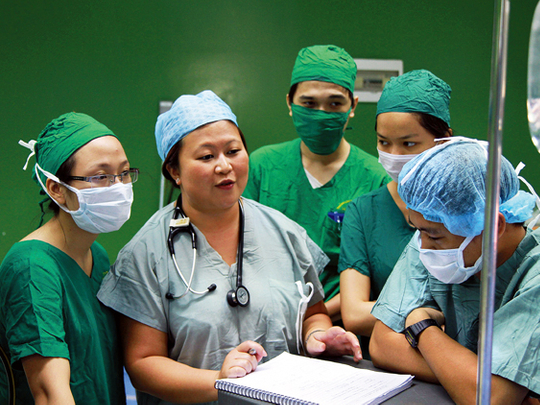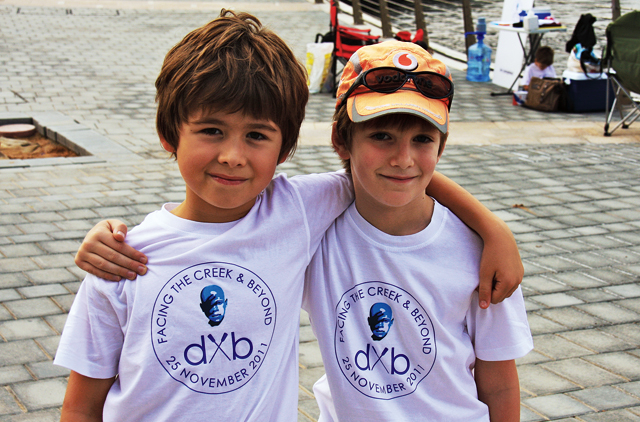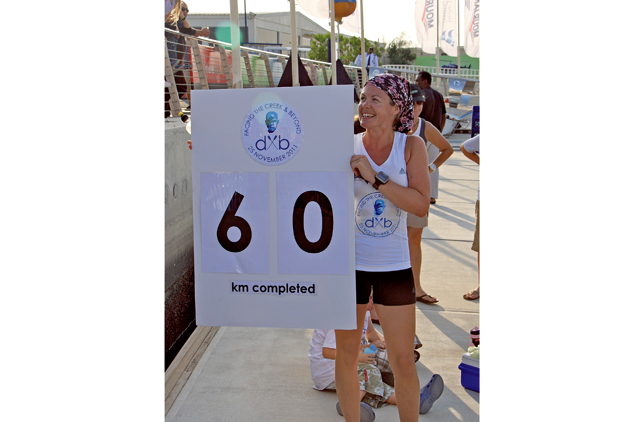
Gritting her teeth, Sarah Silvey triedto ignore the pain. The muscles in her arms burned with exertion, every sinew in her body felt like it had been stretched to breaking point, yetshe couldn't - wouldn't - give up. The Dubai-based homemaker was half-way througha 60-kilometre non-stop row along Dubai Creek to raise funds for Facing the World, a UK-based charity offering pioneering surgery around the world to children with severe facial deformities.
While some are born disfigured due toa faulty gene, others start their lives healthy but are struck down by tumours or accidents. Whatever the cause, the result is the same: each child carries deep emotional and psychological scars because of the exclusion and isolation they face.
She had been inspired by her brother-in-law, James Cash, who rowed across the Atlantic for the charity at the end of last year, and explained why by showing her a clip of Facing the World's work on Youtube.
"It made me cry - several times over," Sarah says. "The video is very hard-hitting but I made my sons - Oscar, eight, and six-year-old Felix - watch it so they would realise how fortunate they are. I decided instantly I had to do something meaningful to help those children."
Now ten months later, she was three hours into the hardest physical and mental battle she'd ever endured, but knew every kilometre would raise more money - and help another child face a future with hope.
Reshaping lives
Meanwhile, more than 5,000 kilometres away, walking through the corridors of Vietnam's Danang General Hospital, British anaesthetist Nhathien Nguyen-Lu saw the usual queues of families who'd travelled for days to see the team of UK medics they'd heard could help their disfigured children. But as she finally arrived at the door of the clinic, she did a double take. There, in the throng, she spotted a mother and her twin boys whom she only just recognised. The difference was that this time the previous year - before she'd spent two weeks, working up to 15 hours a day, helping to change their lives - the teenage boys had each been covered with around 30 tennis-ball size tumours.
"I walked back down that corridor and just stood there, staring in amazement,'' Nhathien says. "Last year they'd been the most shy, withdrawn boys who wouldn't stare you in the face, but now, with their tumours successfully removed and healed, they looked just so fantastically normal. Their mum simply wouldn't let go of my hand, telling me how grateful their whole family was for this ‘miracle' we'd performed. Seeing those boys smile at me, I couldn't stop myself crying, something I've only done a handful of times in my whole career."
The twins had been outcasts in their village, not able to attend school because they'd been so badly bullied, and now their lives had been transformed by the surgery. "Knowing there are hundreds of equally deserving and special Vietnamese children out there needing the help of our team is what drives me on and makes the little I can do so special,'' she adds.
Nhathien, a senior specialist registrar anaesthetic doctor on the Imperial Anaesthetic training rotation in London, is just one ofa group of volunteer medics who travel to Danang in central Vietnam each year to setup a training centre to develop facial reconstructive services and help those who previously had no access to treatment. The project is the latest venture of Facing the World (www.facingtheworld.net), a charity launched by some of the UK's top craniofacial surgeons.
Close connections
Vietnam has an urgent need for facial reconstruction centres, partly because of the prevalence of scooters and high incidence of road accidents, and partly because of its history. During the Vietnam War, a dioxin called Agent Orange was used by the US military to clear the forests as part of its Herbicide Warfare programme to deprive guerillas of cover. Danang and Central Vietnam suffered the second-highest concentration of exposure to Agent Orange. According to the Vietnamese government, 4.8 million Vietnamese people were exposed to the toxic compound, resulting in 400,000 deaths and disabilities, and 500,000 children born with birth defects.
For Nhathien, Facing the World hasa particular attraction. Her eight-and-a-half-month-pregnant mother fled Vietnam post war and gave birth to Nhathien in a Malaysian refugee camp. Just three months later Nhathien and her family were reunited in the UK, which they now call home, but know only too well how the country they left still needs help.
"Children born in Vietnam are five times more likely to die before the age of five than those born in the UK, and have very high rates of facial disfigurement,'' she says.
Nhathien says she was first approached to volunteer for Facing the World just over three years ago while working at the Chelsea and Westminster Hospital. Simon Eccles, one of the trustees of the charity, walked into theatre and introduced two Vietnamese surgeons who had been flown over on sabbatical to learn techniques they could take home with them. "Speaking fluent Vietnamese and beinga doctor meant I had a unique perspective and wanted to get involved almost immediately," she says.
Since then she has given up two of her annual four weeks of holiday each year to volunteer in Danang. She says that the Facing the World team has brought many pieces of functioning medical equipment from UK hospitals to Vietnam to increase the number of people they can treat and improve their post-operative prognosis. "Many patients may suffer complications after surgery, and with ECG, blood-pressure monitors, saturation monitors and oxygen face masks, we can really save lives," Nhathien says.
In addition to helping the children, she has taught local doctors and nurses essential life-saving procedures. "One of the most useful skills I teach is life-support resuscitation - it's such a basic but essential skill, and thousands of patients die in Vietnamese hospitals each year because the medical staff don't know how to give CPR properly," she says. "I brought a baby simulation doll over in my luggage which I use to give demonstrations to the other hospital staff. Giving others these basic skills, knowing that even after I've left, countless more people's lives will be saved is a fantastic feeling.''
While Nhathien says the profile of the charity has risen since its formation in 2003, they're still limited by funding. "We volunteer our time and hard work but however much we give, we just want to give more and know how many people aren't being helped. It's the most amazing project and one I'll continue working on for as long as I can foresee… The trips to Vietnam have been a very personal experience to me - not just to be able to give something back to my motherland but also to learn from such beautiful people and culture.''
A ripple effect
Back in Dubai, Sarah was also motivated by wanting to give back to society, a thought that kept her going throughout her six-hour-long row down the city's creek in a two-man scull. Cheered on by her family, friends and a large crowd of well-wishers, she was determined to finish. After all, she had been preparing for this for the last six months, training two to three hours at a time six days a week with Monty Khwaja, proprietor of Dubai's Monty's Rowing School and her coxswain.
"I'd row 15 to 20 kilometres each day; oncea week I would touch 30 to 40 kilometres. ButI had not done a 60-kilometre row before," she says. "It was demanding, both physically and mentally. But my mission to row for charity turned out to be much bigger than I ever imagined it would be.
"I honestly thought I would be up on the creek one morning, row the 60 kilometres, and I would be done. But it was amazing to know that the charity had struck a chord in so many people," she says, recalling the crowds who had gathered to watch her row.
"It was gruelling, but I couldn't give up," she says. "I just kept remembering the children who will benefit from the life-saving surgery to enable them to literally face the world for the first time without fear of rejection."
Sarah completed her mission, saying, "It was worth all the pain."
Intrinsically rewarding
This never-give-up attitude is what spurs Eimear Murphy to continue working with the children in Vietnam hospitals. A plastic surgery nurse consultant based at Chelsea and Westminster Hospital, she has been involved with Facing the World since it was first set up in 2002 by co-founders Norman Waterhouse and Martin Kelly. "We all worked so closely together anyway, our day-to-day lives were so entwined - being part of the charity wasa natural evolution for me and something I've found more rewarding than I can possibly describe," she explains.
Eimear also has the advantage of having done emergency earthquake work in both Pakistan and Haiti, so she certainly knows about practising medicine under pressure and with limited resources. "The skills I've developed of managing teams, assessing patients for theatre, booking surgeons and delivering best practices are all hugely applicable to Facing the World, making sure that patients get the best possible outcome, wherever they are,'' she says.
Four years ago, Eimear became actively involved in planning and launching the new Vietnam Programme, in both a management and a nursing role. "We wanted to teach the Vietnamese medical teams our skills so they could become a self-sufficient unit that could treat the many disfigured children there who needed help," she says. "The doctors and nurses there were very specialised in their own areas, but not in craniofacial surgery."
The following year the Danang clinic opened and Eimear and her colleagues started training local medical teams while also treating disfigured Vietnamese children.
"I remember one little boy called Hong An, one of our first patients at the clinic, who had a bilateral facial cleft, with an open wound under both eyes going down to his mouth, so his nose was effectively hanging free. There were many stages of repair which would take several years to complete, and while we had to fly him back in the first few years, last year for the first time local surgeons could perform the operations with us supervising, which was so amazing. It was like all the hard work we'd put in was bearing fruit.''
While the rest of us might be shocked at some of the disfigurements Eimear and her team see many times a day on their trips to Vietnam, she says this is ‘normal' to them. "To other people they're disfigured, but we're so accepting of seeing these kinds of things we can see past it - we don't get upset because our first reaction is to think we can make them better."
Another girl who remains in Eimear's mind is Trang, a teenager who had a facial tumour, which meant as well as being socially stigmatised, she was physically incapable of reading. "We successfully treated Trang and then she trained to be a teacher, which is amazing - it's something she wouldn't ever have dreamed of, holding down a fantastic job like that. Trang emails us regularly to let us know how she's getting on, which makes your heart melt. One other girl we treated called Khang Ngan had a tumour in her eye - after treatment she got a glass eye and even told us she has a boyfriend now, which is massive. For her not to see herself as ugly but normal is amazing. The rest of her life will be so different now, which makes us all feel very proud.''
Family support
Her hospital colleague, Ilaria Vercueil, a theatre nurse specialising in plastic and craniofacial surgery, shares her sentiments. She becamea volunteer for Facing the World four years ago and as a mum of two she knows how lucky she is to have healthy children - which is why she's made a point of involving them in her charity work. "I've arranged for my children to meet the children flown into the UK by Facing the World so they can get some understanding of just how lucky they are,'' Ilaria explains.
"Two years ago we all went out for lunch with a Vietnamese girl and boy, both of whom had severe facial disfigurement. The boy had a large benign tumour on his face, and the girl only had one functioning eye because she had a tumour behind her other eye, making it protrude. I showed pictures of them to my children beforehand, and even though there was a huge language barrier, withina short while they were playing together and communicating in a way only children can. Seeing the calmness and patience of these children who have so much to deal with really benefits my children."
Ilaria says the way extended families come to support their children through the traumatic experience of surgery and treatment is a huge help. "It can be extremely frightening, but unlike adults, as soon as the pain is gone, with children you see a smile almost straight away," she says. "Each trip you know you've achieved something fantastic when you see those smiles. These families often come from very remote places where they don't have hospitals, where if you have a facial disfigurement you're heavily bullied and simply don't go to school. Through Facing the World we can change people's lives dramatically, and for the better."
How you can help?
Dubai-based Sarah has a webpage where people can donate towards the cause. At the time of going to press she had raised just over Dh43,250.
Additional reporting by Sangeetha Swaroop
Making a difference
- Who: Facing the World
- What: Charity launched by some of the UK's top craniofacial surgeons
- Where: Poor countries aroundthe world
- How: Helping children living with facial deformities













